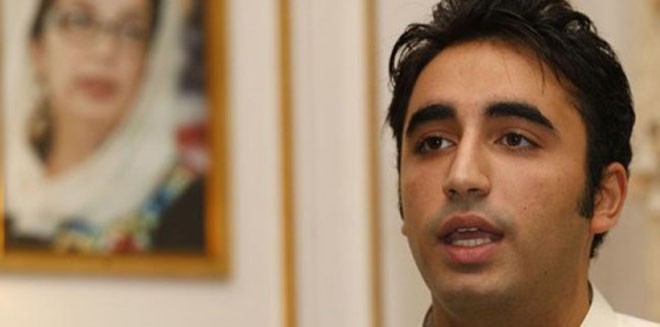

Ever since Prime Minister Nawaz Sharif announced the talk mantra and committees from both sides have actually been constituted and started working, the response of Pakistan People’s Party is being seen with a lot of interest. Particularly because Bilawal Bhutto-Zardari had upped the ante against terrorism in his various speeches and was being seen as the next big thing, bigger than co-Chairman Asif Ali Zardari, in the party hierarchy. Nothing short of a military solution of terrorism was his apparent take.
If press reports are to be believed, Zardari had to step in to stop Bilawal from making any more anti-talks and anti-government statements.
If that is true, does that mean the two have a difference of opinion? Does that make a poor show as far as unity in the party ranks is concerned? Or is that just a public face and the party knows that its stance against terrorism is well-known and it can make a tactical decision of keeping silent at least till the talks are in progress.
In his various interviews with international media, Bilawal has come down hard on Prime Minister Nawaz Sharif and PTI Chief Imran Khan, saying they have let down Pakistan by not backing military action against the TTP.
"I think we have exhausted the option of talks", he is reported to have said in an interview with BBC’s chief international correspondent, Lyse Doucet, which he gave before the talks progress was underway. "Dialogue is always an option but we have to have a position of strength… How do you talk from a position of strength? You have to beat them on the battlefield. They’re fighting us," he had said in the interview.
In a recent interview with The Telegraph’s Rob Crilly conducted on the sidelines of Sindh Cultural Festival in Moenjo-Daro, Bilawal Bhutto said his two-week cultural festival is a symbolic gesture aimed to reclaiming ground lost to militants and extremists.
Sajida Mir, a prominent worker of PPP based in Lahore who is said to have been close to Benazir Bhutto, sees a clear difference of approach between Asif Zardari and Bilawal Bhutto-Zardari on the issue of talks. "Bilawal is right in pointing out that talks with the Taliban have resulted in nothing positive. As far as Asif Zardari is concerned, he is blindly supporting the government of Prime Minister Nawaz Sharif," she says.
Moula Bakhsh Chandio, a senator from Sindh and PPP Vice President in the province, sees the issue in a broader context. "Bilawal’s outburst against the TTP is a statement that should be seen in the overall political context and the need to eradicate extremism from the society and not as something conflicting within the party. Our principled stand against terrorism and extremism is one," he says.
This view is corroborated by political analyst Imtiaz Alam. He thinks the news of Zardari asking Bilawal not to make anti-talks statements is "unfounded". "We have seen Bilawal’s tweets. But where is the statement of Zardari asking Bilawal not to tweet on this issue?" he asks, terming the whole issue as hearsay.
"Bilawal is taking a consistent stance on the issue of terrorism. By doing so, he is also filling in the void created by the assassination of Benazir Bhutto. What the PPP is doing is back the government in its efforts; at the same time take a critical stance on terrorism," says Alam. "There is no conflict there between Asif Zardari and Bilawal Bhutto."
Dr Hasan Askari Rizvi, senior political analyst, sees a clear difference between Bilawal’s tweets and PPP’s principled stand on the issue, "A tweet is one’s personal opinion. It is not the party position as such. Then, Bilawal is a new entrant in politics, inexperienced, young blood. In realpolitik, it’s different," he says.
"I would still not describe it as a conflict of interest between the father and son or within the party itself. The PPP has decided to support the PML-N, even though it does not expect substantial results emerging out of these talks."